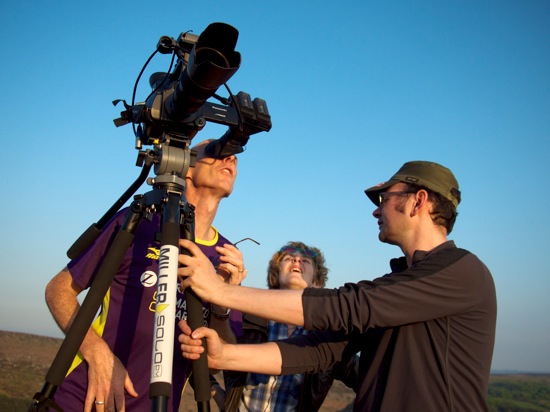The auteur theory of science communication

Prof Steve Haake, producer/director Anna Starkey and camera op/exec. producer Jonathan Sanderson discuss a shot. Photo by camera assistant Ed Prosser while filming Steve’s Engineering Sport series for the Ri Channel.
On his famous seminar Story, the irascible (some might say ‘charmless’) Robert McKee spends a good old chunk of time poo-pooing the whole idea of auteurs in film. They’re defined thus:
auteur n
: a film director who influences their films so much that they rank as their author.
It’s not quite clear from my notes why McKee goes off on such a rant. Probably a Hollywood thing. Or perhaps because it’s French. But it’s a reasonable point anyway, in that the obsessive controlling narcissism shared by directors and writers that everything must be done their way is, for the most part, to be resisted. Even heavily-stylised films like Nicolas Winding Refn’s Drive (which I finally watched and loved this week) don’t spring solely from the creative genius of their director.
He had help. Bet you.
Yet, somehow, science communication seems to have latched onto thinking that one individual can do it all. They can present! They can write! They can make the oh-so-critical choice of material! They can market themselves! They can find the relevance to all different kinds of audiences! They can sing! Dance! Fly! Every communicator of science worth their salt can do everything, and their every action is surrounded by magical unicorns!
The perceptive reader will have gathered I’m not a fan of this way of thinking. There’s a basic arrogance to science, I think because it’s so damned hard that everything else must be easier. Right? And to be fair, I do find scriptwriting easier than I found statistical dynamics.
Marginally. Ever so very slightly.
But I think the real reason is a disconnect we have as audiences. When we watch a film we know that the actors are meat puppets — playing a critical rôle, sure, but if the film’s worth watching there are other strong voices in play, those of the director, writer, cinematographer, production designer, and so on.
What’s obvious for movies isn’t always so clear for TV, particularly when the camera is addressed directly. The myth of the author-presenter is so strong that we remember Bronowski, Burke, Attenborough, Johnny Ball. Yet we’ve no idea who worked with them to realise “their” series, nor what their level of creative control was. Brian Cox did not spring fully formed from the loins of Carl Sagan.
He had help. Bet you.
So — communicators of science: work out what you’re good at. Get help with the rest. Not coincidentally, StoryCog can help. Jonathan’s currently working with a former chemistry prof to build his website and marketing message, and just last weekend Alom helped former FameLabbers refocus their performance voice.
We’re really good at this stuff. Some of it. For the rest, we get help.